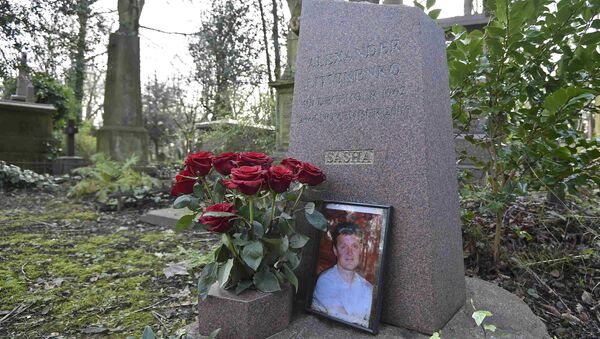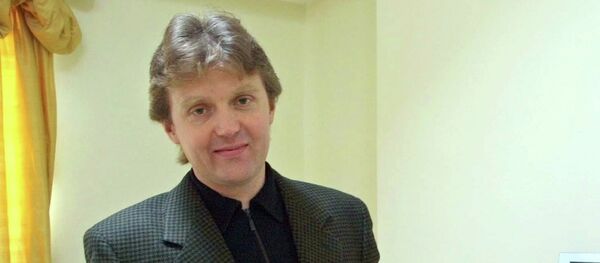Both cases have been investigated by both London and Moscow, amid London's accusations against Russia of having a role in the poisoning of ex-spy Sergei Skripal.
UK Unwillingness to Cooperate
The Russian prosecutors believe that the killing of Litvinenko was beneficial for the United Kingdom as a way of getting rid of one of the key witnesses who could have testified in the Berezovsky case.
Russian Deputy Prosecutor General Saak Karapetyan said that London’s actions in the Skripal case had forced Russia to disclose data on the lack of UK willingness to cooperate with Moscow on earlier high-profile cases.
"In the case of the attack on the Skripals, the United Kingdom simply forced us to do this [disclose data in the cases of Berezovsky and Litvinenko], we would not have done so [otherwise]. We were forced to do this to show the level of cooperation, the attitude toward cooperation and the refusal to engage in cooperation," Karapetyan said.
"As of today, 60 out of 83 requests have been declined. I would like to point out that in 55 cases the requests were declined as these individuals had been granted the status of a refugee or a victim of politically motivated persecution," Karapetyan pointed out.
The official added that the largest number of denials had been issued in the period between 2010 and 2016 when incumbent UK Prime Minister Theresa May was the country's home secretary.
Similar Pattern of High-Profile Cases
The cases of Skripal, Litvinenko, and Berezovsky have been unfolding under the same scenario, whereby unfounded accusations are followed by demands for sanctions against Moscow, Karapetyan suggested.
The Russian prosecutors also noted that in these three cases, the UK authorities had classified the course and results of the investigation, thus violating international law.
Advisor to Russian Prosecutor General Nikolai Atmonyev noted that London had been voicing unfounded accusations against Russia in the Skripal case on the basis of unsubstantiated comparisons with the poisoning of Litvinenko.
Terlyuk Could Have Been Attacked Instead of Skripal
The Russian Prosecutor General’s Office representatives said that a stateless individual or Vladimir Terlyuk who is of Kazakh origin could have been considered by the UK security services as possible targets for an attack instead of Skripal.
In 2006, Terlyuk submitted a written address to the Russian General Prosecutor’s Office. The letter read that between May and September 2003, Berezovsky, Litvinenko, and Alexander Goldgarb, the vice-president of the International Foundation for Civil Liberties, funded by Berezovsky, and their UK lawyers had tried to persuade Terlyuk to lie to the UK law enforcement that he was a Russian security officer, tasked with killing Berezovsky, to create a false basis for receiving refugee status for the latter.
Terlyuk, however, refused to do so, despite threats from these individuals. Berezovsky subsequently addressed the UK law enforcement himself saying that Terlyuk was a Russian security officer instructed to kill him.
In 2003, Terlyuk denied these claims during questioning by the UK police, revealing to law enforcement all the details of the campaign on the alleged planned assault of Berezovsky, organized by the businessman, as well as the actions of his accomplices. In 2010, Terlyuk confirmed the same details in his testimony to a UK court.
During Monday's briefing, Russian Prosecutor General's Office spokesman Alexander Kurennoy revealed the copy of a letter by Terlyuk to Russia's Prosecutor General Yury Chayka dated April 6. Since January, Terlyuk has been addressed by Scotland Yard asking him to "clarify [his] position on cooperation with the Russian Prosecutor General’s Office which is threatening the United Kingdom," the letter, revealed by the Russian prosecutors, read.
In the same document, Teryuk also said he feared for his life, amid the poisoning of Skripal, and noted that his unwillingness to provide false evidence in Berezovsky’s case might affect his citizenship status.
Kurennoy suggested that the UK authorities had been using the lack of certainty in Terlyuk's citizenship status to pressure him into yet another attempt to defame the Russian authorities.
London Ignoring Moscow's Requests
The UK authorities ignored 39 requests by the Russian authorities concerning ensuring Terlyuk’s safety between August 2006 and December 2011, the representative of the Russian Prosecutor General’s Office said.
London has not yet found the perpetrators of an assault on Terlyuk and his wife in 2010, which was committed after he had testified against Berezovsky in a UK court, Armonyev recalled. The UK Home Office denied Russia’s requests to protect witnesses in the case of Berezovsky, the official pointed out.
Above all, Moscow has not received any response to its repeated requests to the United Kingdom about the reasons for granting refugee status to the businessman, Atmonyev also stated.
UK Interested in Murder of Litvinenko
Litvinenko, who received asylum in the United Kingdom, died in London in November 2016. Forensic findings suggested that the Russian ex-security officer had been exposed to the radioactive substance polonium-210. However, the circumstances of his death have not been determined.
Polonium-210 had been stored in London before Lugovoy arrived there, Atmonyev pointed out, adding that traces of the substance were found in Berezovsky’s office.
"I have every reason to assert that Berezovsky was interested in eliminating Litvinenko at that time," Atmonyev added.
Karapetyan also noted that the UK authorities had classified the materials in Litvinenko’s case, and had not provided any evidence in the case to Russia.






